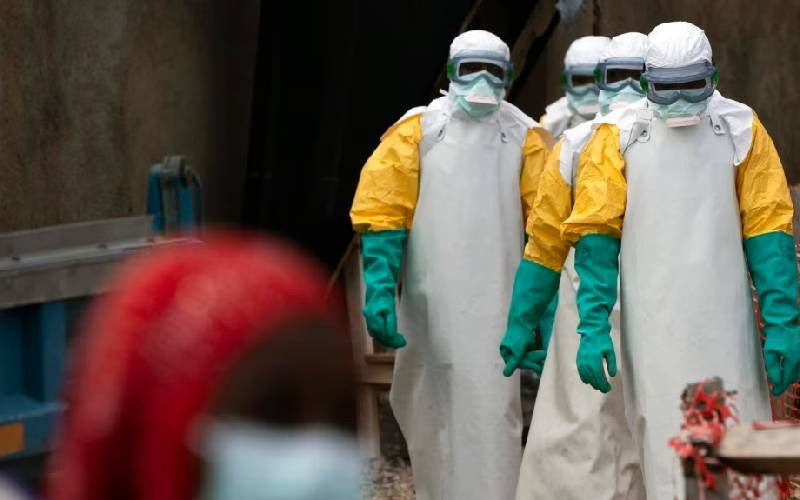That the world has been awakened by the Ebola crisis in West Africa - Guinea, Liberia, Nigeria and Sierra Leone - is not debatable. News channels in all regions of the world have extensively reported on the intensity of the crisis.
The World Health Organisation has termed this a 'global public health emergency' as the socio-economic systems in the affected countries are severely disrupted. Governments are keen to put measures in place to prevent the spread of Ebola into their territories.
The World Bank recently pledged US$200 million to help contain the crisis.
But isn't this the case of too little too late? The world needs to critically think beyond post-crisis response.
Most African countries are highly dependent on external resources for funding. In Liberia, for instance, the Ministry of Health and Sanitation received 8.2 per cent of the total Government budget in 2011, which is way below the target of 15 per cent of total government allocation as per the Abuja Declaration.
Even with the looming crisis, these countries do not have enough medical practitioners to attend to the victims of Ebola.
The right to health is a human right. Article 12 of the International Covenant on Economic, Social and Cultural rights, clearly recognises the right to "the enjoyment of the highest attainable standard of physical and mental health".
Article 12.2 requires parties to take specific steps to improve the health of their citizens, including, inter alia, preventing, controlling and treating epidemic diseases, and creating conditions to ensure equal and timely access to medical services for all.
The right to health encompasses access to timely and appropriate health care. Governments need to prioritise health care as a way of achieving sustainable development.
There is need to allocate enough funds to the health sector, develop and improve the health infrastructure; sufficiently remunerate the health workers and quickly intervene in any situation that might be a threat to the health of citizens.
The technical capacity of medical practitioners, health workers and data analysts needs to be enhanced. By building their capacity, the transfer of cutting-edge health-related knowledge and skills can be achieved.
Citizens also need to be made aware on matters related to health as this has the potential to improve their literacy level. For instance, the World Bank's rating of the countries' literacy levels shows that Guinea and Sierra Leone have some of the lowest literacy rates in the world at 41 per cent and 35.1 per cent respectively. A great deal of investment, therefore, needs to be directed towards empwering citizens through access to information in all its forms.
Sensitisation of citizens on issues relating to prevention and control of diseases, sanitation and regular medical check-ups, has the potential to minimise the outbreak and spread of diseases.
Apart from disease outbreaks, attention should also be given to climate-related disasters as they are closely linked. An effective EWS can potentially reduce the impact of natural disasters - floods, drought, landslides, El-Niño, wildfires - across populations.
Africa, for instance, is one of the worst disaster-hit continents, yet it has insufficient capacity to deal with these disasters. The 5th Assessment report of the Intergovernmental Panel on Climate Change (IPCC) clearly points out that the global surface temperature will continue to rise to 1.5 degrees celsius by the end of the 21st Century.
Stay informed. Subscribe to our newsletter
There is also anticipated increase in the rise of the sea level, warming of the oceans, carbon-dioxide production and change in the global water cycle. All these scenarios point to an increase in climate-related extreme events that would call for an effective EWS. Most of the existing systems, however, are not timely integrated and actionable. Vulnerable communities and sectors continue to be affected by disasters and more often, get information after the disasters have occurred.
Governments have the responsibility to reduce the impact of climate change on its citizens by proactively working towards reducing the risk and addressing the root causes of climate change.
The Kenya government has an elaborate climate-change action plan, yet vulnerable communities in the interior and inaccessible regions of the country continue to severely suffer from the impacts of climate change - drought, famine, floods and water scarcity.
More effort is needed to reverse this trend. Climate change and other disasters are here with us... We need to act now. The ability to deal with all forms of disasters depends on functional systems. Could we do better?
 The Standard Group Plc is a
multi-media organization with investments in media platforms spanning newspaper
print operations, television, radio broadcasting, digital and online services. The
Standard Group is recognized as a leading multi-media house in Kenya with a key
influence in matters of national and international interest.
The Standard Group Plc is a
multi-media organization with investments in media platforms spanning newspaper
print operations, television, radio broadcasting, digital and online services. The
Standard Group is recognized as a leading multi-media house in Kenya with a key
influence in matters of national and international interest.
 The Standard Group Plc is a
multi-media organization with investments in media platforms spanning newspaper
print operations, television, radio broadcasting, digital and online services. The
Standard Group is recognized as a leading multi-media house in Kenya with a key
influence in matters of national and international interest.
The Standard Group Plc is a
multi-media organization with investments in media platforms spanning newspaper
print operations, television, radio broadcasting, digital and online services. The
Standard Group is recognized as a leading multi-media house in Kenya with a key
influence in matters of national and international interest.







